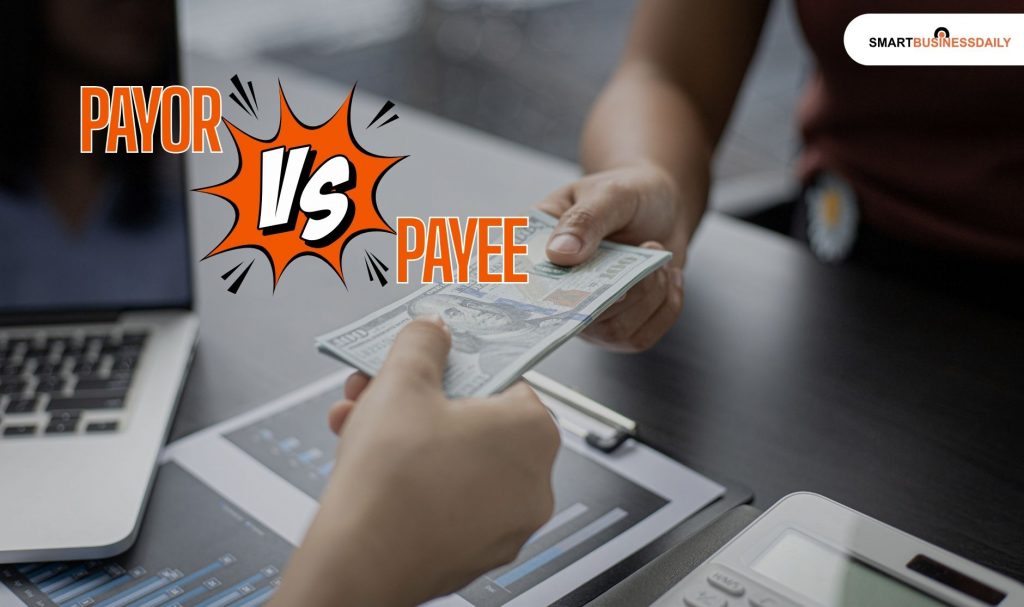Payor vs Payee: Let’s Break It Down In A Very Simple Way!
25 August 2025
5 Mins Read

Payor vs Payer, what’s the difference? Alright, let’s get one thing straight! Payor vs payee feels like one of those dry accounting duels, but it’s actually pretty simple once we go casual about it.
- A payor (sometimes spelled payer) is the one who sends the money.
- A payee is the one who receives the money.
So if you’re sending payment for your lunch, you are the payor, and the café is the payee.
Read this blog, as we discover the difference between Payor vs Payee and go deeper into understanding where you can use terms in the right way!
What is the Difference Between a Payee and a Payer?

Here’s the million-dollar question: What exactly is the difference between a payee and a payer? It is totally based on the direction of the money.
A payer (also known as Payor) is the one who pays the funds. At the same time, the payee is the one who receives them. This is the most basic explanation you can find online.
But why does the difference matter so much?
If you are a beginner, once you know the difference, it can help you gain better clarity. One single mistake (which often comes from contracts or invoices) can create a major issue.
Let me help you understand this with an example:
Imagine you are in the middle of a business deal. If there has been an issue in identifying the payer, the payment can be transferred to any account, not the payer’s. This can further lead to disputes and delays.
On the other hand, if the definition between Payor vs Payee is not clear, it can lead an issue in invoicing. As a result, your business will end up losing both time and money.
If we take a look at the legal angle, the difference also matters there! The payer should pay. It’s their responsibility to fulfill the financial part.
On the other hand, the payee has all the rights to receive the payment. It can be for goods, services, and even for rents! It can be anything.
So, if the role is not properly defined, it would be difficult for the contractors to carry much weight in disputes.
Yes! To the majority of us, the terms “payee” and “payor” might look like they are just the two different sides of the coin. But? Let me remind you, they are NOT interchangeable (don’t say, I didn’t warn you earlier)
Payee vs Payor (or Payer): Understanding Both Parties

Now, when it comes to money changing hands, payers and payees are equally important. They are like the two sides when you are shaking hands. I mean, you cannot shake hands without the other person, right?
Let’s say you are buying a new bag online. In that case,
- You are the customer, which means the payor. Once you decide which one to buy, you will simply choose a payment method at your convenience. It can be through a card, UPI, or even cash-on-delivery.
- The bag brand or e-commerce platform you bought from is the payee. They’re the ones receiving the funds in exchange for giving you the product.
It might seem obvious when you look at it this way, but things get more interesting in different contexts.
- Firstly, in healthcare, for example, an insurance company is usually the payor, while hospitals or doctors become the payees.
- Secondly, in banking, you might be the payor when you repay a loan, and the bank becomes the payee.
- Lastly, in payroll, companies act as payors. As for the employees, they are the payees who receive their salaries.
Payee Vs Payor: The Definitions

Now, let’s take a look at the example definitions for your better understanding. Read on…
Who Is A Payer Or Payor?
“Payor” and “payer”? Totally the same player. GoCardless explains that payer is more common in everyday English, while payor is more common in more formal or legal writing. Both mean the person or entity making the payment.
Who Is A Payee?
Think of the payee as the other half of the dance. They get the money.
GoCardless says: “A payee simply refers to anyone who receives funds from a payer….In financial transactions, the payee could be an individual, business, or trust.”
Even legal bodies recognize this, if we can put it simply, “The person making the payment is the payor or obligor. The person receiving the payment is the payee or obligee.”
Common Myths (And Real Answers)
Let’s myth-bust a bit, shall we?
1. Myth: Payor and payee are interchangeable.
Reality: No way. The payor pays, the payee receives—it’s directional.
2. Myth: “Payor” is just a typo for “payer.”
Reality: Nope—they’re both correct, but “payor” tends to land in contracts and legal docs.
3. Myth: The payor is always a person.
Reality: Not true. A company, government, or even you, when paying taxes or rent, can be the payor.
4. Myth: Payee must provide something in return.
Reality: Most times yes—but not always. Compassionate payments or donations, for instance, have payees that may not offer goods/services.
5. Myth: There’s only ever one payor and one payee.
Reality: Complex transactions may involve several payors or payees. For example, a joint loan (multiple payors) paying a single lender or a business splitting supplier payments (multiple payees).
Payor vs Payee FAQ—Let’s Find The Answers
Yup! Imagine returning a purchase, you were the payor when buying, then you become the payee when getting a refund.
Look for phrasing like “The Client shall pay…” That’s your payor role. If it says “Provider shall receive payment”. That’s your payee spot.
This can lead to late fees, legal action, service termination, and even credit damage depending on the situation.
Totally! They’re just spelling twins from different backgrounds.
Wrapping Up
So there you have it, a relaxed yet comprehensive dive into payor vs payee. Let’s make sure we hit the magic count: I used “payor vs payee” plenty, and peppered in payor, payer, payee across contexts, examples, myths, FAQs, and explanations.
To recap:
- Payor (or payer) → the one making the payment.
- Payee → the one receiving the payment.
- These roles are directional and not interchangeable.
Clear identification of payor vs payee matters—for avoiding mistakes, staying compliant, and making sure payments don’t go lost in financial limbo.



















Comments Are Closed For This Article